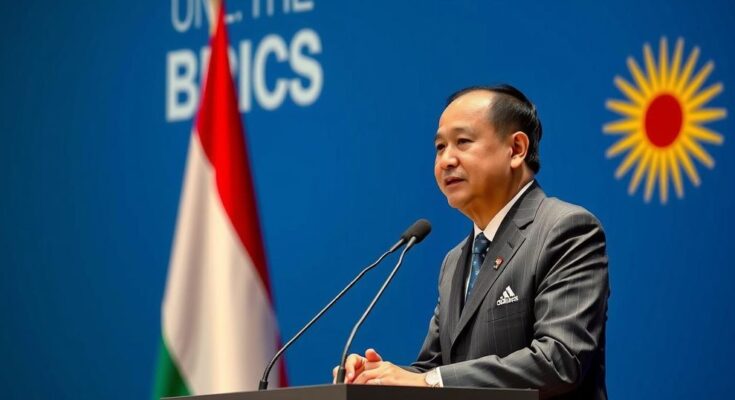Indonesia has been granted the status of a BRICS partner nation, allowing it greater opportunities for cooperation with a group aiming to challenge Western dominance. This announcement coincided with Foreign Minister Retno Marsudi’s first overseas trip, during which BRICS leaders convened to discuss the need for a more multipolar global order. Thirteen new countries, including Indonesia, joined as partners; however, they lack voting rights in decision-making processes within BRICS. Future discussions will determine their readiness for full membership.
Indonesia has officially gained the status of a BRICS partner nation, enhancing its prospects for collaboration within a prominent economic coalition that seeks to contest the prevailing Western-dominated global paradigm. This development follows extensive deliberations about Indonesia’s ambitions to join the BRICS group, which consists of Brazil, Russia, India, China, and South Africa. The announcement coincided with Foreign Minister Retno Marsudi’s inaugural overseas journey post-inauguration on Monday, wherein significant diplomatic engagements occurred. During the recent three-day summit held in Kazan, Russia, BRICS members convened with numerous foreign dignitaries to promote a multipolar world order, fueled by a burgeoning disenchantment with Western institutions. The session, led by Russian President Vladimir Putin, focused on diminishing reliance on the United States dollar, expanding the BRICS alliance, and establishing a more equitable global framework. Reports indicate that a total of thirteen countries, including Indonesia, Malaysia, Thailand, Vietnam, Turkey, and Cuba, have attained partner status within BRICS. However, it is crucial to underscore that this partnership entails limited participation; Indonesia and the other partner nations will not be afforded voting rights in BRICS decisions, nor will they possess full participation in meetings and summits. Kremlin representatives have suggested that discussions regarding these nations’ readiness for full membership will persist into the future.
The BRICS grouping has emerged as a significant player on the international stage, primarily representing emerging economies that challenge the Western-dominated global governance structures. The term BRICS originally referred to Brazil, Russia, India, China, and South Africa. In light of shifting geopolitical dynamics and increasing calls for a multipolar world order—especially post the Ukraine conflict—BRICS has sought to expand its reach and influence. The recent admission of new partner countries illustrates a commitment to fostering stronger ties among like-minded nations that seek alternatives to existing Western-led systems. Indonesia’s entry as a BRICS partner underscores its strategic intent to position itself within this growing economic bloc and to diversify its international partnerships.
In conclusion, Indonesia’s acquisition of BRICS partner status marks a pivotal moment in its foreign policy and international relations, enabling the nation to partake in a collaborative framework that aspires to redefine the global order away from Western hegemony. The partnership opens avenues for economic cooperation and collective diplomacy, although it distinctly falls short of complete membership rights. The ongoing discussions regarding the potential for full members indicate continued dialogue and engagement within this influential coalition of states.
Original Source: www.thejakartapost.com




